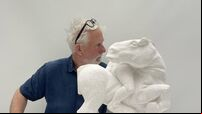A simple and free test saved my life

A LIFE SAVED: Bernard Wallace from Ballyphehane, whose bowel cancer was detected through the free BowelScreen programme run by the HSE National Screening Programme
IF Ballyphehane-based Bernard Wallace hadn’t done a home bowel screening test two years ago, he would be dead. That was the stark reality that an oncologist outlined to the retired painter and decorator.
Today, Bernard, aged 68, is healthy and free of the cancer that was cut out from his bowel following a test that showed part of it was cancerous.
April is bowel cancer awareness month and the
National Screening Service, part of the HSE, is encouraging men and women aged 60 to 69 who receive free BowelScreen kits in the post, to take part in the programme. All they have to do is take a small swab from a stool on a piece of toilet paper and send it to the relevant address.
With BowelScreen, 95% of people will have a normal home test result and invited to take the test again two years later.
Bowel cancer is Ireland’s second deadliest cancer but it is highly preventable and treatable if diagnosed early. Bernard says that, apart from treatment for prostate cancer in 2008, he always had good health. But the bowel cancer diagnosis was unexpected. There is no history of it in his family and he hadn’t detected any changes in his bowel movements.
“The bowel testing kits came to our house, one for myself and one for my wife,” says Bernard. “My wife didn’t bother doing the test but I can tell you, she eventually did when I got my result. She was clear.

“The test is very simple. I know people might wonder about it but you take the tiniest little swab. Everybody should do it.”
Within a week of Bernard sending back the test kit, he got a phone call asking him to come into the Mercy University Hospital. He was told about the results of the test and sent to Cork University Hospital (CUH). There were more tests there. Bernard praises the staff at both hospitals whom he describes as “fantastic and a great ”.
“Within a couple of months, I had the operation. The doctor thought the cancer might be taken out through keyhole surgery but in the end, I had to have open surgery. Afterwards, everything was explained to me. A little part of the bowel had been taken out. It was caught in time. I didn’t have to have chemotherapy or radiotherapy.”
Bernard had to have a stoma bag attached to his body with tubes to allow the waste from his bowel going into it. That, he says, was the hardest part of his ordeal.
“I had that bag for 21 months. Being kind of young, I found it easy to adapt to. Everyone who uses a stoma bag has a few mishaps. You have to put a mirror in front of you when you’re changing the bag. If you’re patient with it from the start, it becomes fairly natural after a while.”
Since his surgery, Bernard has become more health conscious. He plans to do more walking and watches his diet, eating a lot more white meat, such as chicken, than red meat.
“Strangely enough, I’m not allowed eat much brown bread, just white bread. I used to get gout but I haven’t had it for a while. I love fruit such as apples and oranges but the acid in them aggravates the gout. I just have an odd apple or orange. I take a drink, a beer or a glass of wine or maybe a pint of stout occasionally.”
Bernard, who is a father of four, goes for regular check-ups and will be having an MRI soon. He urges people to avail of the bowel screening test as it saved his life.
Professor Diarmuid O’Donoghue, clinical director of BowelScreen, says: “Bowel cancer is a big killer in Ireland. On average, over 2,500 people are diagnosed with it each year in Ireland and over 1,000 lives are lost. But the good news is that bowel cancer is one of the most preventable and treatable types of cancer.
“Bowel screening, through a simple home test, can detect abnormal changes which can develop into cancer over time. These changes often have no signs or symptoms.

“However, if they are caught at an early stage through screening, there are more treatment options and a higher chance of survival. That’s why screening is so important.” He adds that the home testing kit, for men and women, is non-invasive. However, only 40% of people take part in the programme, with a lower proportion of men than women.
For a small number of people, the test might result in a referral for further examination, a colonoscopy. About half of these colonoscopies detect and remove pre-cancerous growths, preventing bowel cancer from developing.
Professor O’Donoghue says that BowelScreen’s latest figures show how the programme is saving lives. To date, it has detected 718 cancers and removed almost 19,000 pre-cancerous growths or polyps.
People are being encouraged to check that they’re on the BowelScreen to receive their home test. Freephone 1800 45 45 55 or visit
Be more physically active.
Eat a diet with plenty of dietary fibre such as fruit, vegetables and wholegrain bread, brown rice and cereals.
Reduce intake of processed and red meat.
Keep to a healthy weight.
Limit alcohol consumption.
Take part in the BowelScreen programme when invited.
Over 2,500 cases of colorectal cancer reported in Ireland each year according to latest published figures from the National Cancer Registry of Ireland (NCRI). That’s just over 1,000 cases in women and almost 1,500 cases in men.
On average there are over 1,000 deaths in Ireland every year as a result of colorectal cancer.
Screening may detect bowel cancer at an early and curable stage.
The screening test is free and can be done in the privacy of your own home. It only takes a few minutes and could save your life.
Bowel screening aims to find bowel cancer at an early stage in people who have no symptoms.
Bowel screening can detect changes in the bowel at an early stage when treatment is more effective and there are better outcomes.
Regular screening is important – changes in the bowel can develop over time so getting screened every two years can give you the best chance of detecting any changes in the bowel.
Only 40% of eligible people take part in BowelScreen. Less men than women take part, even though men are more affected by bowel cancer.







 App?
App?


